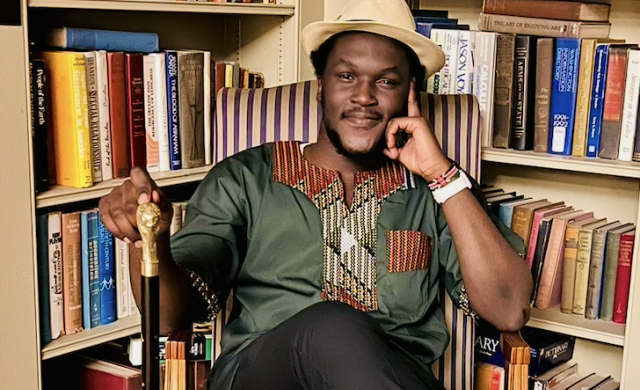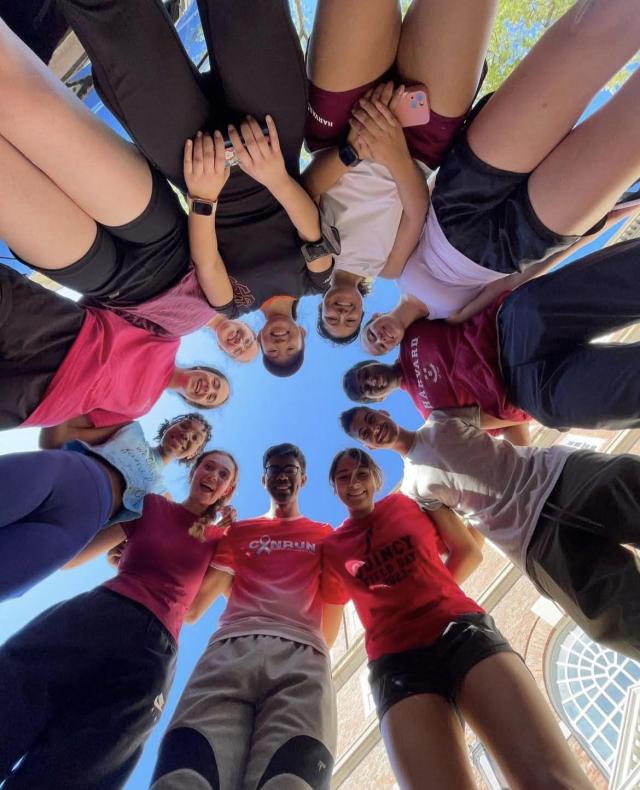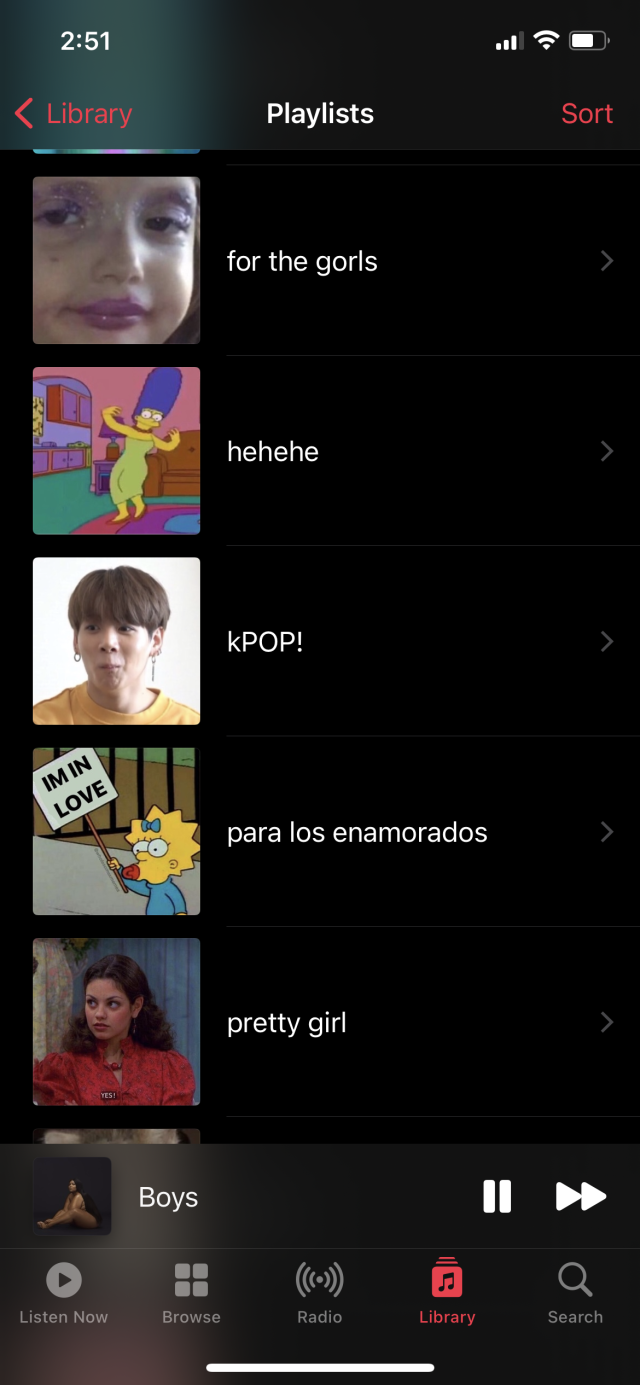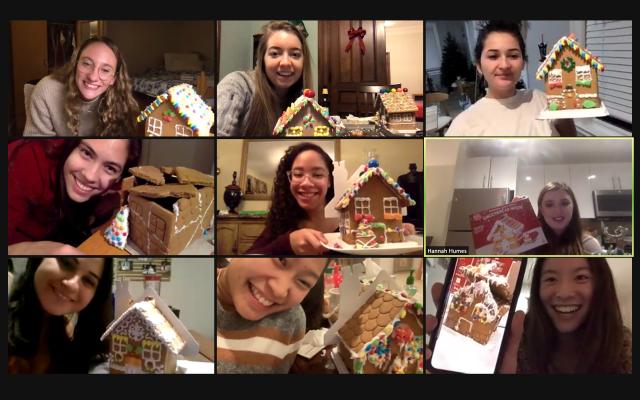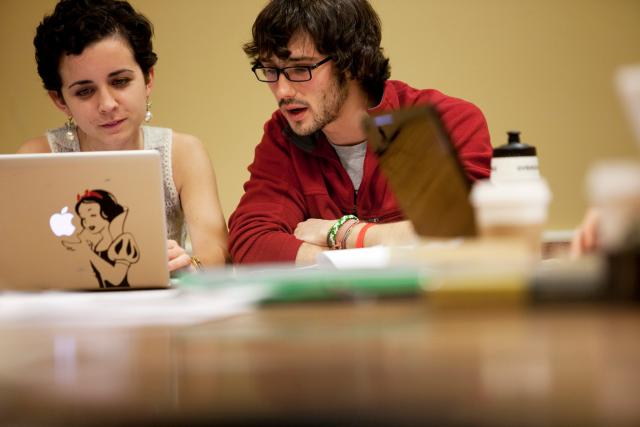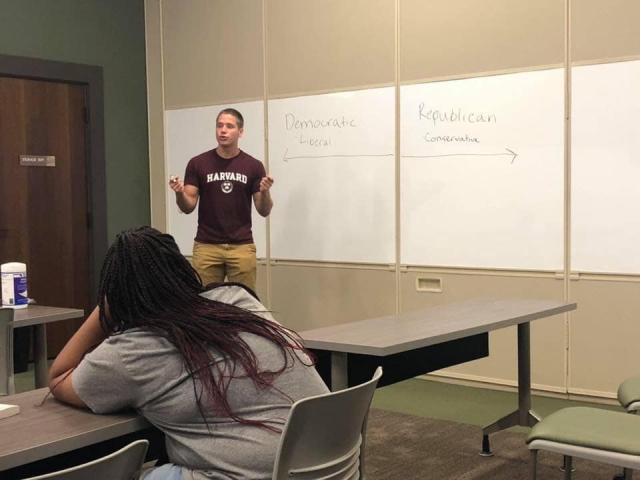It’s the afternoon of the big day, and my room is alive. The kind of alive where clothes are flung across the bed like they’re auditioning for the main act. On my speaker, “Harusi" by Issa Matona plays like a blessing in song, its taarab rhythm gliding between nostalgia and celebration.
A moment later, “Wapeni Njia Warembo” by Ukhty Dida kicks in, its upbeat call echoing with the shared joy of Swahili weddings from both sides of the border. Kenya, Tanzania — two hearts beating in one language. I dance a little as I dig through my options. The mirror reflects my half-buttoned excitement. Today, I’m not just dressing for a performance. I’m dressing for a wedding at the annual Africa Night with Harvard African Students Association (HASA).
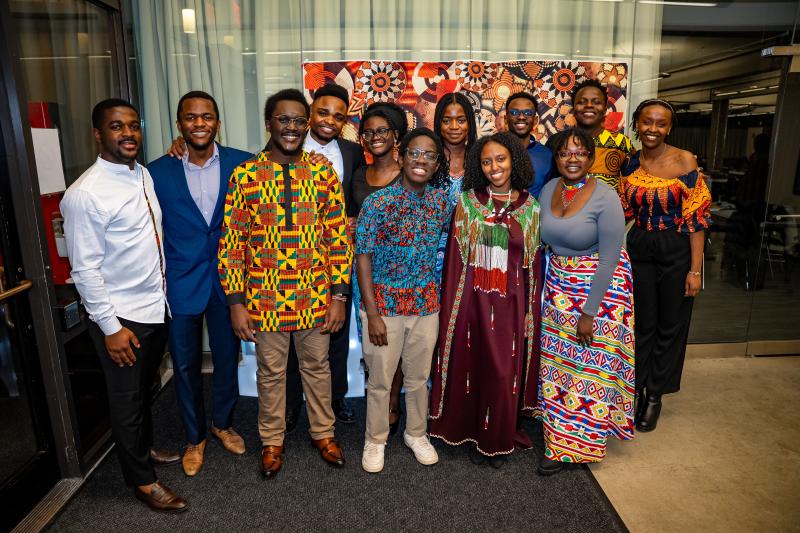
A photo of some of the African class of 2025 in the wedding, aka "The Tribe"
Eric Vasquez '25
I finally settle on the outfit that feels like a celebration all on its own — a vibrant kente shirt blazing with gold, crimson, and emerald, stitched like a visual drumbeat of regality. I pair it with simple brown trousers, letting the shirt do the talking, and a staff crowned with a golden lion, an accessory so dramatic it looks like it’s auditioning for a Netflix epic. My friend Jules, who is also the best man and a senior from Rwanda, walks in like he’s been summoned by ancestral rhythm. He nods approvingly and then holds out a small bottle like it’s sacred. “Don’t forget your oud sir,” he says. Not just any oud — my favorite Swahili-Arab scent, bought on a sun-slicked afternoon in Mombasa over winter break. The room fills with its smoky richness, a scent that feels like Lamu, like home, like history. I glance in the mirror. I'm not just a groom anymore — I’m an aesthetic declaration. Jules grins. “Bro, you're ready.” I believe him.
We pull up to the Student Organization Center at Hilles (SOCH) in style — and by style, I mean a Harvard shuttle that I ride like it’s a stretch limo. I sit at the very back like a groom in a motorcade, giving the occasional slow nod to confused undergrads boarding, as if to say: “Yes, today is the day.” Jules and I step out with the confidence of a delegation arriving from Wakanda, my lion-topped staff clinking lightly against the pavement. As we walk into the venue, the sound of "Wabiro" (we’re coming) by Coster Ojwang — a beloved tune from my Luo tribal heritage — pours through the room. It’s not just a song; it’s a summoning. The crowd cheers. Timi Esan slides behind the keyboard like a seasoned wedding band veteran. It’s soft, sentimental, and perfectly ridiculous — just like everything else tonight. The fake African wedding was phenomenal.
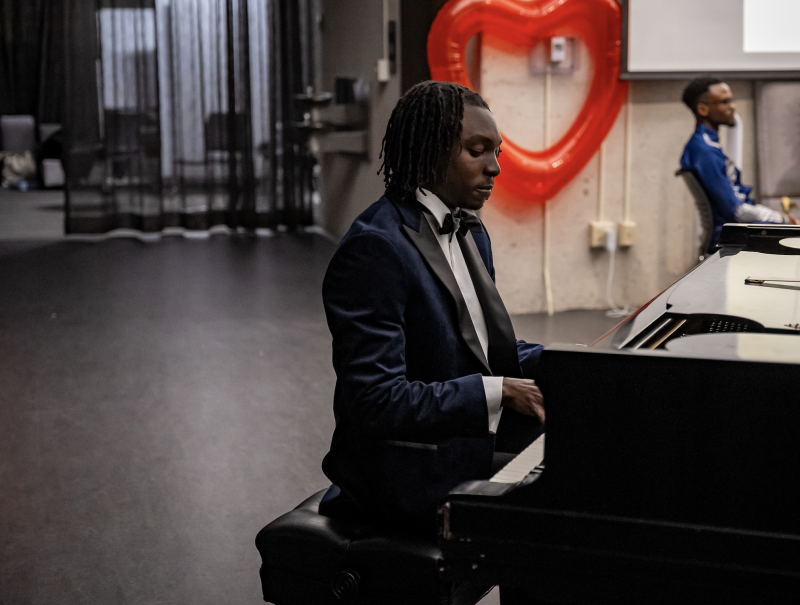
Timi Esan on the keys
Eric Vasquez
I still think about the food. We descended upon the buffet table like ancestors had whispered to each of us, “You didn’t come this far to eat lightly.” It was a pan-African culinary parade, a passport stamped with spice, grease, and decisions we do not regret. You may question the marriage, but you cannot question the flavor of the plantains we descended on thereafter.
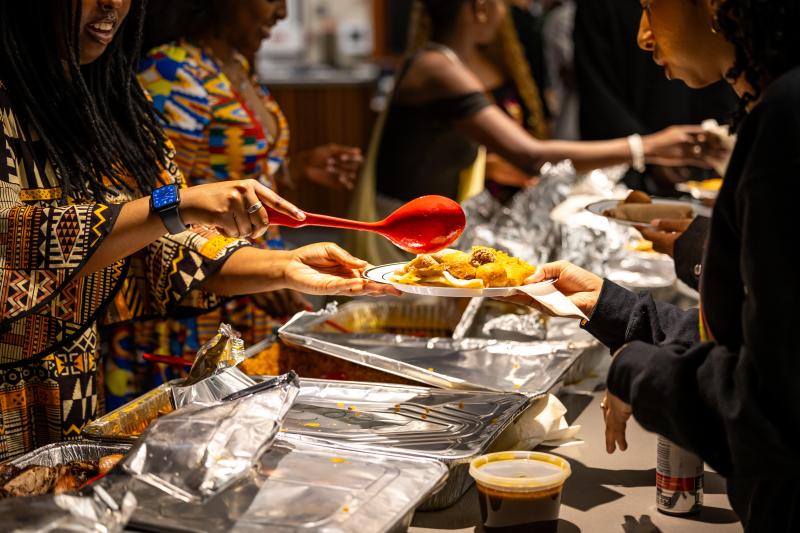
Food is served at the wedding
Eric Vasquez
There was Kenyan pilau, rich and fragrant, each grain of rice seemingly blessed by a coastal auntie. Next to it, Tanzanian chapati, golden and flaky. The Ethiopian injera was very inviting. Jollof rice stood loud and proud (and slightly spicy), flanked by puff puff, beef stew, and Caribbean fruit drinks that made you feel like you were sipping history with a straw. There was no “modest portion.” There was only the silent calculation of how much diplomacy it takes to pull together a whole continent’s cuisines (and its diaspora) on one paper plate without it collapsing.
For all the jokes, for all the performances, there’s something tender beneath it all: Africa has never felt far from me at Harvard. The memory shared above is one of many experiences I’ve had on campus that has made Harvard feel like home. Even thousands of miles from Kisumu, I’ve found home again and again — in the beat of a djembe, the smell of chapati, the Swahili phrases exchanged in passing. Whether it’s reciting poems at Africa Night or hosting a dinner table with friends from (and of) Africa, I’ve watched our cultures live and breathe in this place. I’ve eaten jollof more times in Cambridge than I have back on the continent, and I’ve watched Kenyan taarab make a roomful of students feel like they were floating off the coast of Mombasa. These aren’t just events. They’re small acts of cultural defiance and joy: soft reminders that no matter where we are, we carry our countries with us.
The Kenyan American Prof. Ali Asani is the first professor I met when I stepped foot on campus. He warmly welcomed me to Harvard College, and taught my freshman seminar. The Center for African Studies has played a quiet but powerful role: hosting conferences, panels, and gatherings that remind me Africa isn’t just present at Harvard — it’s thriving here. I’ve shaken hands with African entrepreneurs from Lagos to Nairobi at the annual HBS Africa Business Conference, shared laughs with change-makers, and left each year with my vision for the continent stretched wider than before. I fondly remember when the Center for the Study of African Societies and Economies (CSASE) organized Africa Alive, an unprecedented gathering of Harvard’s African alumni and alumni passionate about Africa’s future. I met various leaders from the continent including the former President of Ethiopia, Sahle-Work Zewde, and my role model, the Nobel Laureate Prof. Wole Soyinka. And of course, none of this would be complete without HASA, which has given us everything from the weekly African Dinner Table (ADT) to unforgettable feasts like Africa Night and the Fall Feast. The spontaneous mixers with other African societies were gatherings that blurred the line between networking and family reunions. HASA didn’t just give plan events — it gave me a campus-sized version of home.
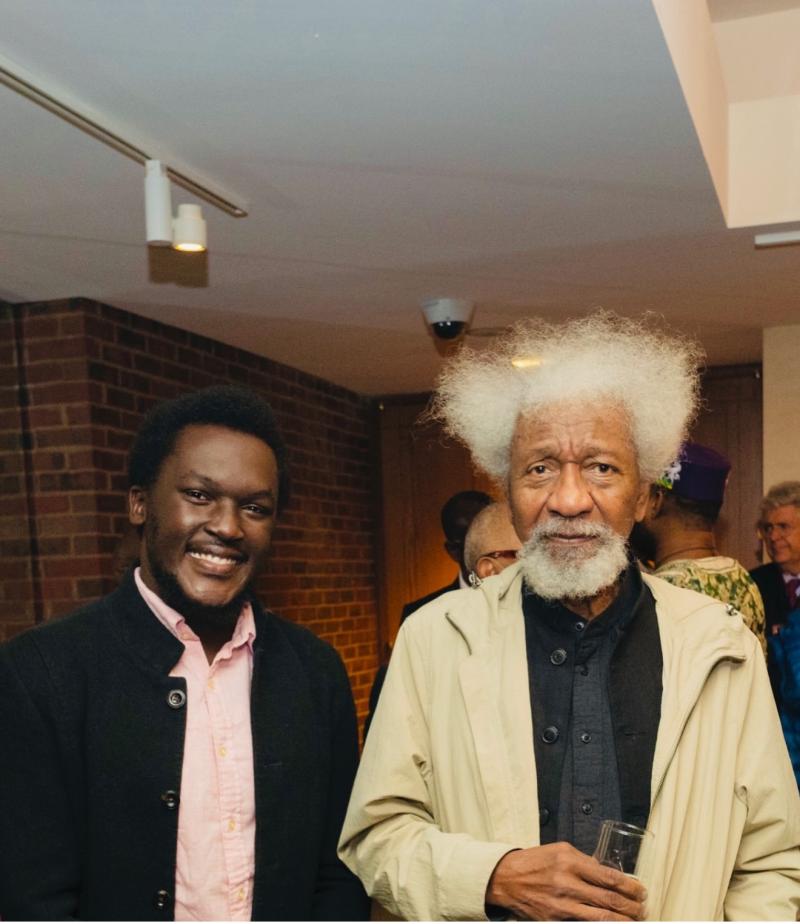
A photo of me and Prof Wole Soyinka during Africa Alive
Harvard Law School's CSASE
Now that graduation is here, I’ve been thinking a lot about the things I’ll carry with me from this place. And surprisingly, it’s not the late nights in Lamont Library or the math problem sets that aged me four years — it’s the moments that felt like Africa had pulled up a chair and said, “Let’s make this campus a little louder, a little warmer, a little more us.”
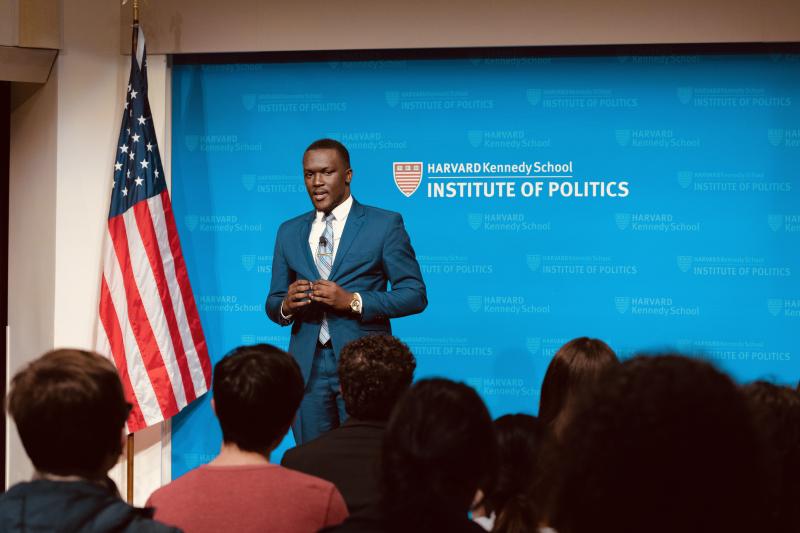
Making a speech at the IOP at the JFK Jr. Forum
Harvard Institute of Politics
Moments like a fake wedding that sparked real joy, or performing Swahili poetry at Africa Night, or attending conferences with African entrepreneurs at HBS, joining African Dinner Tables that turn into storytelling salons, or even giving a speech about my Kenyan experience at the HKS Institute of Politics. Somehow, in the heart of Harvard — where centuries of formality and tradition echo off the walls of Widener Library — I found space to be deeply, joyfully East African. I’m not just earning a degree here. No. I built a little Kisumu on campus, danced through Cape Town, recited lines from Lamu, and wore kente like it was couture.
David in graduation regalia & a Kenyan stole
Eric Vasquez
So, when people ask what Harvard gave me, I’ll say: a diploma, a diaspora, and just enough chaos to make it all unforgettable. Because sometimes the classes seemed challenging and time seemed to be scarce, but the memories, the mishaps, and the meaning? Realer than the residual norm in my least squares regression (forgive my jargon, I’m an Applied Mathematics major).

